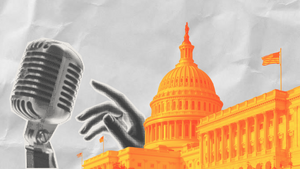US Congress member Deborah Ross yesterday introduced an updated Protect Working Musicians Act which seeks to make it easier for independent music-makers to collectively negotiate with digital and technology companies that want to make use of their music.
It is an update of proposals previously made by Congress member Ted Deutch, who stood down from the House Of Representatives last year. The focus of the original version of the act was the streaming platforms, though the new version also talks about music-making AI.
An explainer for the proposed legal reforms states: "Under current laws, small and independent musicians have little ability to bargain for market value rates for the use of their music by global streaming platforms, such as Spotify and Apple Music".
"Instead", it adds, "they are forced to accept whatever terms are offered by these platforms, while also having almost no ability to engage with AI companies who routinely scrape and use their music without permission or consent. This legislation allows independent artists to band together and collectively negotiate with large streaming platforms and AI developers, without the obstacles of antitrust laws".
Independent artists usually get their music onto streaming platforms like Spotify and Apple Music via distributors, which in turn negotiate licensing deals with the streaming services or rely on deals negotiated by global digital rights agency Merlin.
That means artists are always at least one step removed from any deal negotiations and are not allowed to know the specifics of any deals that have been agreed.
With user-generated content platforms, artists can usually directly upload their music, and read the terms and conditions published by the platform. Though, of course, those terms are non-negotiable.
Meanwhile, with music AI platforms, not all AI companies are yet convinced they even need licences to make use of existing music. Some are, though how they will go about licensing music remains to be seen. However, for independent artists, it seems likely that participation will be via distributors or take-it-or-leave-it generic terms.
Although it doesn't go into too much detail about what alternative approaches could be employed to allow independent artists to interact with digital platforms and technology companies in a more equitable and transparent way, Ross's act seeks to ensure things like competition law wouldn't get in the way of any such alternatives.
Says Ross: “Working musicians and small independent labels face urgent challenges to their livelihoods posed by the market power of streaming platforms as well as the explosion of AI applications that use their work without licensing or pay".
"This legislation", she goes on, "will help give small, independent music creators a level playing field, empowering them to stand together for fairer compensation and giving them a voice in important negotiations that will determine the future of the music industry".
The act is endorsed by the American Association Of Independent Music and the Artist Rights Alliance.
The former's CEO Richard James Burgess says: "Thank you Rep Deborah Ross for championing the rights of artists through the introduction of the Protect Working Musicians Act. The PWMA would help level the playing field for indie artists who struggle to make a living from the mega-corporations that control the streaming marketplace".
ARA Executive Director Jen Jacobsen adds: “Musicians today are fighting for fair treatment on so many fronts, including both in the online streaming marketplace and against the growing threat posed by AI companies who exploit creators’ work without permission".
“The Protect Working Musicians Act", she continues, "will give small and independent artists a shot at facing these challenges by allowing them to negotiate collectively with the large and powerful entities who profit from musicians’ hard work. We thank Rep Ross for her leadership in empowering creators with tools to navigate this ever-changing market".

